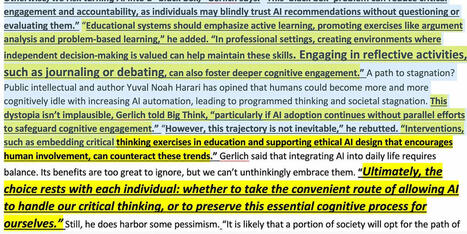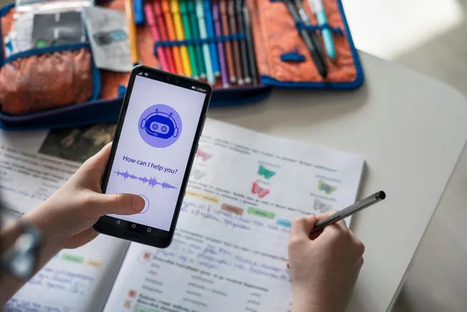Social media is becoming increasingly important in teaching and research work but tutors must remember, it's a conversation not a lecture, says Ernesto Priego...
Get Started for FREE
Sign up with Facebook Sign up with X
I don't have a Facebook or a X account


 Your new post is loading... Your new post is loading...
 Your new post is loading... Your new post is loading...
Watch this video to learn more about the fully online, accelerated, project-based Master of Education in Educational Technology at the University of Texas Rio Grande Valley. For more information, visit: https://www.utrgv.edu/edtech/index.htm
EDTECH@UTRGV's insight:
This 30-hour accelerated program designed to prepare persons in K-12, higher education, corporate, and military settings to develop the skills and knowledge necessary for the classrooms and boardrooms of tomorrow. Students in this program have the opportunity to earn one or more graduate certificates in E-Learning, Technology Leadership, and Online Instructional Design. 
harrietwatkins's curator insight,
August 24, 2024 10:34 PM
This is a fantastic program! Its practical, real-world based and applicable to many areas of industry where teaching and learning, training and development are used.

Katlego Mofokeng's curator insight,
May 19, 3:46 PM
Using technology in education proves affective in helping students/ learners accelerate their learning progress.
A look at OpenAI, Anthropic, and Google's new study modes and what might come next.
EDTECH@UTRGV's insight:
"OpenAI, Anthropic, and Google have all launched dedicated learning experiences within their flagship products, and this represents a fundamental shift in how AI companies think about education."
From
bigthink
By doing more and more of our "thinking" for us, artificial intelligence may be diminishing our critical thinking skills.
EDTECH@UTRGV's insight:
“Ultimately, the choice rests with each individual: whether to take the convenient route of allowing AI to handle our critical thinking, or to preserve this essential cognitive process for ourselves.”
Are we trying to eliminate cell phones in classrooms, or are we trying to teach responsible use via school device policies?
EDTECH@UTRGV's insight:
"School can be a place to practice responsible tech habits–not just prohibit them"
How often people use ChatGPT varies by country—India leads with 36% daily users, while Japan has the lowest daily adoption at 6%.
EDTECH@UTRGV's insight:
"India has the highest daily ChatGPT usage at 36%, well above the global average of 17%. Japan has the lowest daily usage (6%) and one of the highest “rarely” rates at 42%."
AI won’t replace teachers--but thoughtful AI use can lead to deeper student engagement and increased classroom efficiency.
EDTECH@UTRGV's insight:
"As artificial intelligence (AI) continues to reshape the educational landscape, teachers have a unique opportunity to model how to use it responsibly, creatively, and strategically."
"Disruption isn’t an occasional hurdle; it’s the new normal. According to McKinsey research, 84 percent of leaders report feeling underprepared for future disruptions"
EDTECH@UTRGV's insight:
"Employees are adopting AI faster than many leaders expected, but without the right support, they can’t harness its full potential."
"I’ve already heard the whispers around the halls: “How do I stop my students from using ChatGPT to cheat?” But I think we’re asking the wrong question. Instead of asking how to stop them, we should be asking: Why are they turning to AI in the first place? And here’s the uncomfortable truth: the answer has less to do with laziness and a lot more to do with grades."
EDTECH@UTRGV's insight:
"[S]tudents weren’t cheating because they didn’t care. They were cheating because they cared too much about performing in a system where points, grades, and credentials often outweigh actual learning."
"Generative AI (GenAI) is set to reshape the workforce, redefining career pathways and talent development. However, despite public anxieties about mass displacement, GenAI’s biggest impacts won’t be on the number of jobs so much as on the level of expertise required to do them."
EDTECH@UTRGV's insight:
"In many other fields where expertise grows with tenure, entry-level work may be supplanted by AI with significant consequences for how firms find and develop talent"
Winner of the 2025 Systems Thinking & Change Division Outstanding Book Award from the Association for Educational Communications and Technology!
Teaching and Learning in the Age of Generative AI explores how educators can effectively harness the potential of artificial intelligence technologies while skillfully navigating its pedagogical, technical, ethical, institutional, and societal implications.
Table of Contents
Part I. Foundations and Frameworks of AI in Education
Part II. Transformative Teaching and Learning with AI
Part III. Ethical and Institutional Considerations
Part IV. Preparing Educators and Students for AI Integration
Part V. Future Trends and Implications of AI in Education
EDTECH@UTRGV's insight:
With a clearer understanding of student behaviors, educators can design assignments that thoughtfully incorporating AI as a learning aid.
EDTECH@UTRGV's insight:
"As AI becomes a fixture in student workflows, the nature of learning itself is being reshaped in real time. While anecdotal evidence and one-off surveys offer glimpses into how students engage with these tools, what’s been missing is sustained research into their evolving behaviors."
Stephanie Schneider examines how AI is reshaping our understanding of knowledge and challenging traditional concepts
EDTECH@UTRGV's insight:
"What does it mean to ‘know’ something? And what happens when machines seem to know things too? Can machines possess knowledge in the same way humans do?"
From
thehill
"For decades, the entry-level job has been a crucial proving ground — a place to build skills, make connections and begin a career. But in the age of artificial intelligence and automation, many of these critical early roles are disappearing."
EDTECH@UTRGV's insight:
"One recent report estimates that more than 90 percent of information technology jobs will be transformed by AI, and that nearly 40 percent of those roles will be at the entry level." |
If AI follows the same add-on trajectory of edtech in most classrooms, don’t bet on it to transform traditional schools.
EDTECH@UTRGV's insight:
Key takeaway: don’t bet on AI transforming traditional schools.
From
edu-ai
"Until now, technological advancement has meant that as time progresses, the outcomes we can anticipate from technology improve: phones get smarter, cars self-drive, and computers run factories. However, that was when technology was a straightforward program that completed a task. The more advanced the task, the more complex the programming to meet the task’s expectations. Artificial intelligence (AI), however, is the exception to this technology rule because it is not a program, and as it gets smarter, it may leave our control in favor of its own."
EDTECH@UTRGV's insight:
"[T]he alignment problem is the potential for a machine’s purpose to reach a developmental stage and speed where its goals do not align with human goals, which may cause unknown tragic consequences for humankind"
"The widely-shared study on AI reducing critical thinking has been misinterpreted as an argument against AI in education. In reality, the author advocates for teaching students to think critically with AI, not without it."
EDTECH@UTRGV's insight:
"[T]the author advocates for teaching students to think critically with AI, not without it [by] implementing debate formats and project-based learning that incorporate AI tools."
While artificial intelligence tutors appear to gain traction in schools, little research exists on the efficacy of these tools for students.
EDTECH@UTRGV's insight:
"Schools’ growing interest in artificial intelligence tutoring tools comes at a time when district leaders are being encouraged by the federal government to learn into AI more."
New, accredited colleges and universities, positioned as disruptive relative to traditional institutions, may soon appear.
EDTECH@UTRGV's insight:
"Although accredited higher education institutions will continue to exist, many will consequently look quite different from what the dominant ones do today"
From
www
Anthropic’s new higher-ed advisory board and AI fluency courses reveal where campus AI is heading: policy, skills, integrity and responsible deployment.
EDTECH@UTRGV's insight:
"By convening top academic leaders, Anthropic is signaling that it doesn’t just want universities to use Claude, it wants them to help define the rules of engagement."
"Key findings from Inside Higher Ed’s student survey on generative AI show that using the evolving technology hasn’t diminished the value of college in their view, but it could affect their critical thinking skills."
EDTECH@UTRGV's insight:
"Student Voice respondents have mixed views on faculty use of generative artificial intelligence for teaching, but they’re widely using AI to augment their own learning."
"This paper examines changes in the labor market for occupations exposed to generative artificial intelligence using high-frequency administrative data from the largest payroll software provider in the United States. We present six facts that characterize these shifts. We find that since the widespread adoption of generative AI, early-career workers (ages 22-25) in the most AI-exposed occupations have experienced a 13 percent relative decline in employment even after ontrolling for firm-level shocks."
EDTECH@UTRGV's insight:
Key Takeaway: The adoption of new technologies, including AI, often causes uneven impacts across workers, prompting a period of adjustment as labor shifts from displaced roles to emerging areas of demand
|

|
Scooped by
EDTECH@UTRGV
August 29, 11:42 AM
|
Twin surveys of chief online learning officers highlight the gap between student expectations and institutional maturity when it comes to online education. This year is primed to be a pivotal one for online learning, with the number of undergraduates studying fully online surpassing that of peers studying fully in person for the first time. Now two new surveys of chief online learning officers are helping point the way forward, past this critical moment.
"Colleges and universities must level up to close the gap between student expectations and institutional preparedness."

|
Scooped by
EDTECH@UTRGV
August 29, 11:38 AM
|
Preparing for 2030 requires more than updating software, it requires updating mindsets while still embracing the core cultural literacies in the arts, sciences, and the humanities.
"In a world increasingly shaped by artificial intelligence (AI), big data, automation, and global interconnectedness, digital literacy must equip individuals to think critically, act ethically, and adapt rapidly to technological change."


|
Scooped by
EDTECH@UTRGV
August 29, 11:35 AM
|
"Technological breakthroughs in the 21st century have changed how people live in nearly every aspect of society. Advancements in information technology, communication, healthcare, education, transportation, and entertainment have significantly impacted our daily lives, jobs, and interactions, enhancing efficiency, accessibility, and connectivity across industries. Artificial intelligence (AI) offers a valuable contribution in this regard."
"Academia (faculty and students) can benefit from AI’s potential by incorporating AI literacy into the curriculum and establishing explicit usage policies."

|
Scooped by
EDTECH@UTRGV
August 29, 11:29 AM
|
Researchers offer a new model of Instructional Design for the age of AI
"Generative AI presents a long-awaited opportunity to innovate ADDIE and reimagine how we analyse, design, deliver & evaluate learning experiences."






























Ringkasan:
Dengan perkembangan zaman, para pekerja academia mau tidak mau harus bisa adjust dengan perubahan uang terjadi di dunia academia terutama dalam bidang riset dan juga mengajar. Berkembangnya dunia digital membuat akses terhadap karya ilmiah serta bahan ajar menjadi lebih terjangkau. Saat ini para pengajar dan pelaku riset juga memanfaatkan media sosial tersebut, termasuk juga Twitter. Twitter adalah suatu platform yang dapat digunakan untuk bertukar informasi dan berkomunikasi langsung dengan para pengikut. Tak jarang banyak konten akademik yang dibahas secara mendalam dan intens melalui Twitter ini.
Namun di samping kemudahan untuk mempublish artikel akademik , salah satu tantangan yaitu bagaimana bisa terus mempertahankan komunikasi dan engage dengan pengikut. Salah satu poin penting yang perlu diingat juga bahwa membuat konten akademik online tidak menjamin kan dibaca oleh orang lain. Maka dari itu perlu dilakukan proses “engagement” tersebut.
Tambahan Pemikiran:
Kita tidak bisa menutup mata dengan berkembangnya media sosial di era saat ini. Di satu sisi media sosial memang sangat membantu terkait dengan akses, menjadikan karya tulis atau artikel dapat dengan mudah di bagikan kepada masyarakat umum. Namun disatu sisi memang yang sering terlupakan adalah mengenai hal “engagement”. Dengan adanya kemudahan tersebut, semua orang dapat membagikan karya tulis ataupun memulai suatu diskusi online. Namun, masing-masing individu harus pintar dalam membagikan dan juga tetap berinteraksi dengan pengikutnya.Tentunya tautan atau tulisan yang kita bagikan ingin dibaca juga oleh orang lain. Selain itu, kita juga harus pintar mencari feedback dari orang lain yang membaca. Mungkin tidak secara langsung dengan menanyakan “apakah ada feedback? Namun dengan adanya komunikasi dan engagement yang aktif, kita bisa banyak mendapatkan informasi dari pengikut kita.